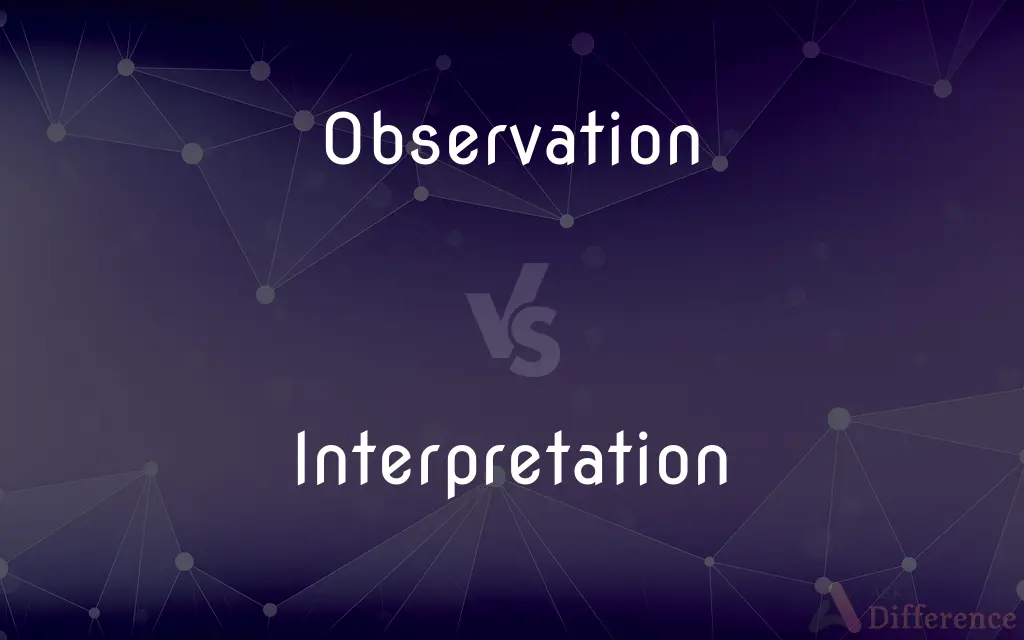Observation vs. Interpretation — What's the Difference?
Edited by Tayyaba Rehman — By Maham Liaqat — Updated on April 29, 2024
Observation involves collecting data or noting facts as they are, while interpretation involves explaining or making sense of those observations.

Difference Between Observation and Interpretation
Table of Contents
ADVERTISEMENT
Key Differences
Observation is the act of noticing or perceiving something using the senses, often in a detailed and systematic way to gather data. On the other hand, interpretation involves analyzing observations to infer meaning or draw conclusions, integrating personal or theoretical perspectives.
In scientific research, observation serves as the foundational method for empirical data collection, focusing purely on what is perceivable without any bias or explanation. Whereas interpretation comes into play after observations have been made, using theoretical frameworks or prior knowledge to understand and contextualize the data.
Observation can be objective and quantifiable, such as measuring temperature or recording behavior in a controlled setting. Interpretation, however, is subjective, relying on one's background, experiences, and prior knowledge to explain or contextualize the observed data.
Observers are trained to be neutral, minimizing personal bias to enhance the reliability of the data collected. Conversely, interpreters often apply their subjective judgment and expertise to translate observations into meaningful insights or actionable information.
Observation often provides the raw data needed in various fields, such as science, surveillance, or market research. Interpretation, on the other hand, is essential for transforming these data into useful knowledge, such as in policy making, educational content development, or business strategy formulation.
ADVERTISEMENT
Comparison Chart
Definition
Noting or recording facts or data
Explaining or making sense of observations
Nature
Objective and factual
Subjective and analytical
Role in Research
Data collection
Data analysis
Required Skill
Precision and attention to detail
Critical thinking and analytical skills
Outcome
Data, facts
Insights, conclusions
Compare with Definitions
Observation
The action of observing something carefully in order to gain information.
Observation of wildlife requires patience and stealth.
Interpretation
The action of explaining the meaning of something.
Interpretation of historical texts requires understanding of the context.
Observation
The process of monitoring or noting something with the aim to gain data.
Scientific observation involves accurately recording behaviors or reactions.
Interpretation
The way in which someone perceives or represents a data set or event.
Artistic interpretation can vary widely among performers.
Observation
A remark or statement based on something one has seen, heard, or noticed.
The teacher made an observation about the student's progress.
Interpretation
The process of making sense of other languages or symbols.
Legal documents often require careful interpretation.
Observation
The act of observing, and sometimes participating in, a situation without intervening.
The anthropologist used participant observation for her research.
Interpretation
An expression of the significance or meaning attributed to characters or events.
The director's interpretation of the play brought a modern twist to the story.
Observation
Data or information obtained from systematic observation.
The data was collected through hours of detailed observation.
Interpretation
An analytical or conceptual form of understanding.
Each scientist offered a different interpretation of the experimental results.
Observation
Observation is the active acquisition of information from a primary source. In living beings, observation employs the senses.
Interpretation
The act or process of interpreting.
Observation
The act of observing
Observations of a rare bird.
Interpretation
A result of interpreting.
Observation
The power or faculty of observing.
Interpretation
An explanation or conceptualization by a critic of a work of literature, painting, music, or other art form; an exegesis.
Observation
The fact of being observed
Kept the suspect under observation.
Interpretation
A performer's distinctive personal version of a song, dance, piece of music, or role; a rendering.
Observation
The act or process of perceiving something, such as a phenomenon, often by means of an instrument, and making a record of the resulting information.
Interpretation
(countable) An act of interpreting or explaining something unclear; a translation; a version.
The interpretation of a dream, or of an enigma
The interpretation of the rules
Observation
The result or record of such an act or process
A meteorological observation.
Interpretation
(countable) A sense given by an interpreter; an exposition or explanation given; meaning.
Commentators give various interpretations of the same passage of Scripture.
Observation
An inference, judgment, or remark that is made by observing
Made some sharp observations about the movie.
Interpretation
The discipline or study of translating one spoken or signed language into another (as opposed to translation, which concerns itself with written language).
Observation
The act of observing, and the fact of being observed (see observance)
Interpretation
(uncountable) The power of explaining.
Observation
The act of noting and recording some event; or the record of such noting.
Interpretation
(countable) An artist's way of expressing his thought or embodying his conception of nature.
Observation
A remark or comment.
Interpretation
(countable) An act or process of applying general principles or formulae to the explanation of the results obtained in special cases.
Observation
A judgement based on observing.
Interpretation
An approximation that allows aspects of a mathematical theory to be discussed in ordinary language.
Observation
Performance of what is prescribed; adherence in practice; observance.
Interpretation
An assignment of a truth value to each propositional symbol of a propositional calculus.
Observation
A regime under which a subject is routinely observed.
Interpretation
Heritage interpretation
Observation
Philosophically as: the phenomenal presence of human being existence.
Interpretation
The act of interpreting; explanation of what is obscure; translation; version; construction; as, the interpretation of a foreign language, of a dream, or of an enigma.
Look how we can, or sad or merrily,Interpretation will misquote our looks.
Observation
(stochastics) A realization of a random variable.
Interpretation
The sense given by an interpreter; exposition or explanation given; meaning; as, commentators give various interpretations of the same passage of Scripture.
Observation
The act or the faculty of observing or taking notice; the act of seeing, or of fixing the mind upon, anything.
My observation, which very seldom lies.
Interpretation
The power or explaining.
Observation
The result of an act, or of acts, of observing; view; reflection; conclusion; judgment.
In matters of human prudence, we shall find the greatest advantage in making wise observations on our conduct.
Interpretation
An artist's way of expressing his thought or embodying his conception of nature.
Observation
An expression of an opinion or judgment upon what one has observed; a remark.
To observations which ourselves we makeWe grow more partial for the observer's sake.
Interpretation
The act or process of applying general principles or formulæ to the explanation of the results obtained in special cases.
Observation
Performance of what is prescribed; adherence in practice; observance.
We are to procure dispensation or leave to omit the observation of it in such circumstances.
Interpretation
A mental representation of the meaning or significance of something
Observation
The act of recognizing and noting some fact or occurrence in nature, as an aurora, a corona, or the structure of an animal.
Interpretation
The act of interpreting something as expressed in an artistic performance;
Her rendition of Milton's verse was extraordinarily moving
Observation
The act of making and recording a measurement
Interpretation
An explanation that results from interpreting something;
The report included his interpretation of the forensic evidence
Observation
The act of observing; taking a patient look
Interpretation
An explanation of something that is not immediately obvious;
The edict was subject to many interpretations
He annoyed us with his interpreting of parables
Often imitations are extended to provide a more accurate rendition of the child's intended meaning
Observation
Facts learned by observing;
He reported his observations to the mayor
Observation
The act of noticing or paying attention;
He escaped the notice of the police
Observation
A remark expressing careful consideration
Common Curiosities
Why is it important to separate observation from interpretation in research?
Separating the two ensures that data is not contaminated by the observer's expectations or theories, leading to more reliable results.
Is interpretation always necessary after observation?
While not always necessary, interpretation is often essential to derive meaningful conclusions from observations.
What is the main difference between observation and interpretation?
Observation is about collecting data as it is, while interpretation is about explaining or analyzing that data.
How does bias affect observation and interpretation?
Bias can influence both; however, it is more likely to affect interpretation, where subjective judgment is used.
What skills are important for effective observation?
Attention to detail, neutrality, and systematic documentation are key for effective observation.
What tools assist in observation and interpretation?
Tools like cameras, sensors, and software help in observation, while models, theories, and frameworks aid in interpretation.
Can observation exist without interpretation?
Yes, one can observe without interpreting, especially in data collection phases where objectivity is crucial.
What skills are important for effective interpretation?
Critical thinking, analytical skills, and a deep understanding of context are essential for effective interpretation.
How do observation and interpretation contribute to decision-making?
Observation provides the data, and interpretation helps make sense of this data to support informed decisions.
Can interpretation change with different perspectives?
Yes, interpretations can vary widely depending on the observer's background, theory, or context.
Share Your Discovery

Previous Comparison
Stare vs. Glance
Next Comparison
Skirt vs. SkortAuthor Spotlight
Written by
Maham LiaqatEdited by
Tayyaba RehmanTayyaba Rehman is a distinguished writer, currently serving as a primary contributor to askdifference.com. As a researcher in semantics and etymology, Tayyaba's passion for the complexity of languages and their distinctions has found a perfect home on the platform. Tayyaba delves into the intricacies of language, distinguishing between commonly confused words and phrases, thereby providing clarity for readers worldwide.












































